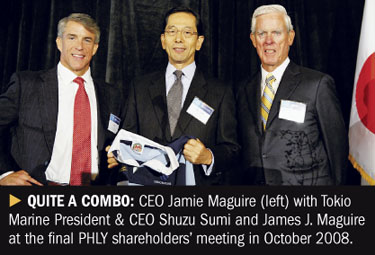 When Tokio Marine Holdings Inc. announced it would acquire Philadelphia Consolidated Holding Corp. for $4.8 billion in July 2008—near the height of the global economic meltdown—market-watchers were impressed but not overly surprised at the hefty price tag. Some four years on, many agree, the deal still looks smart.
When Tokio Marine Holdings Inc. announced it would acquire Philadelphia Consolidated Holding Corp. for $4.8 billion in July 2008—near the height of the global economic meltdown—market-watchers were impressed but not overly surprised at the hefty price tag. Some four years on, many agree, the deal still looks smart.
Robert Farnam, senior vice president of equity research with Keefe, Bruyette & Woods, says that Philadelphia had been shopping itself around for a while prior to the sale.
“It was fairly expensive on a price-to-book basis, but the company was doing a lot of things right, and I had an ‘out-perform’ on it at the time,” Farnam recalls. “Tokio paid a lot for it up front, but they had a long-term view.”
Recommended For You
Want to continue reading?
Become a Free PropertyCasualty360 Digital Reader
Your access to unlimited PropertyCasualty360 content isn’t changing.
Once you are an ALM digital member, you’ll receive:
- Breaking insurance news and analysis, on-site and via our newsletters and custom alerts
- Weekly Insurance Speak podcast featuring exclusive interviews with industry leaders
- Educational webcasts, white papers, and ebooks from industry thought leaders
- Critical converage of the employee benefits and financial advisory markets on our other ALM sites, BenefitsPRO and ThinkAdvisor
Already have an account? Sign In Now
© 2025 ALM Global, LLC, All Rights Reserved. Request academic re-use from www.copyright.com. All other uses, submit a request to [email protected]. For more information visit Asset & Logo Licensing.








